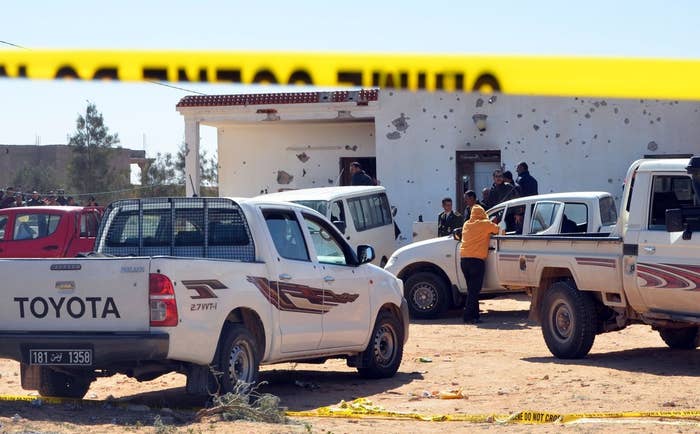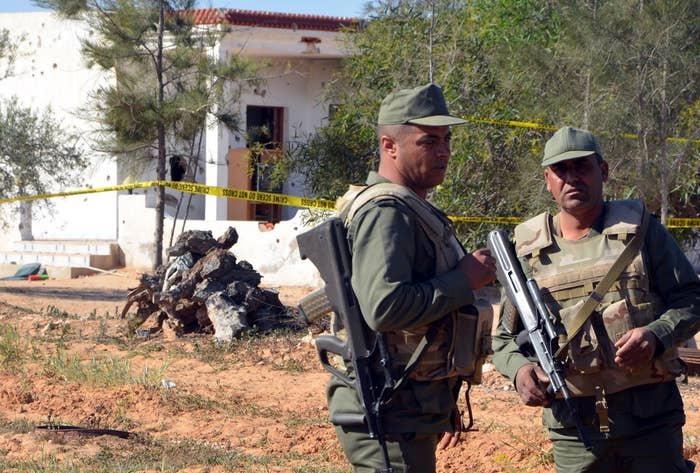
The gunfire began at around dawn prayers on Monday. At first the townspeople thought some pranksters were setting off fireworks. Instead, using mortars and small-arms, suspected ISIS jihadis had stormed the Tunisian town of Ben Gardane, along the Libyan border. The militants, likely dislodged by U.S. airstrikes on the Libyan town of Sobrata, assured the citizens that they were there solely to fight the security forces, not the people. They moved in three groups, hitting the army barracks as well as police stations. They sought to hide in people's houses, and told them not to be afraid.
What followed was an hours-long gunfight that ultimately led to the defeat of the jihadis, at the hands of both Tunisian security forces and people from the gritty, hardscrabble town.
"The people and the security forces worked hand in hand," said Saeed Amri, a 25-year-old unemployed college graduate, speaking to BuzzFeed News from Ben Gardane. "Things were tense. Some were afraid. But unity was the thing we saw most, especially between the people and the security forces."
Ultimately a day of ferocious clashes left at least 7 civilians and 12 members of the security forces dead, along with about 36 jihadis.
Speaking to the Tunisian people, President Beji Caid Essebsi called the attack unprecedented in its ambition and coordination. "Their aim was perhaps to control the area, and to announce a new state," he said.
For security experts and officials monitoring jihadi groups in North Africa, the Ben Gardane attack was a terrifying illustration of ISIS's ambitions and gumption, effectively trying to snatch control of a major town in Tunisia right out from under the noses of security forces.

Their failure, prompted in part by the refusal of local citizens to join with them, also underscores the crucial element local sympathy or acquiescence to the group plays in its successes. Though Ben Gardane is impoverished, it's not a war zone and Tunisia generally remains fairly stable and unified — the sole success story of the 2011 Arab Spring uprisings. Unlike Syria, Libya, Egypt or Yemen, there are no cavernous sectarian or regional differences to exploit.
Quickly realizing the town of 80,000, a major trading outpost between Libya and Tunisia, was under attack, the people of Ben Gardane faced two choices: wait inside until the clashes ended, or help the security forces. Numerous citizens chose the latter, and that may have been decisive.
People of the town, residents told BuzzFeed News, picked up stones and began throwing them at the militants, calling out "Long live Tunisia." Others worked the phones, calling security forces and telling them the locations in which the enemy was hiding. One person opened his house and welcomed all and any member of police and the security forces to rest inside, witnesses told BuzzFeed News.
"The terrorists would set up in houses and the security forces would surround them," said Amri. "It would usually end in some security and civilian martyrs but at the end, the terrorists were defeated."
Civilians helped move the injured to the hospital, and served food and water to the security forces. Others simply provided moral support by moving with security forces to the locations of the clashes, urging them on against the invaders.
"There was heavy fighting and shooting, we could hear it clearly," the owner of a textile shop told BuzzFeed News. "But then the army came and now they're completely gone, with the help of civilians. We helped out by pointing out where they were hiding, which houses they were hiding in. Whenever you saw one of the terrorists, you would tell the army, and with our help they were all finished."
But the attack also likely indicates Tunisia's vulnerabilities and the threat ISIS's Libyan operation poses to its neighbors. ISIS has recruited heavily among Tunisians, and many worry that sleeper cells lie in wait for a Zero Hour to stage an even larger attack.


